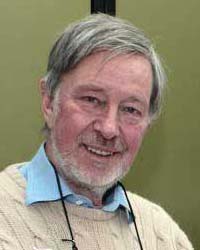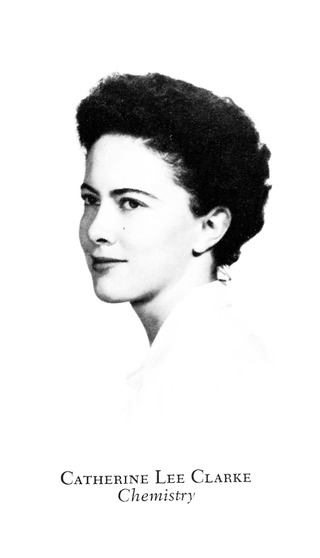
Klaus Biemann was an Austrian-American professor of chemistry at the Massachusetts Institute of Technology. His work centered on structural analysis in organic and biochemistry. He has been called the "father of organic mass spectrometry" but was particularly noted for his role in advancing protein sequencing with tandem mass spectrometry following pioneering work conducted in this area by Michael Barber.
The American Society for Mass Spectrometry (ASMS) is a professional association based in the United States that supports the scientific field of mass spectrometry. As of 2018, the society had approximately 10,000 members primarily from the US, but also from around the world. The society holds a large annual meeting, typically in late May or early June as well as other topical conferences and workshops. The society publishes the Journal of the American Society for Mass Spectrometry.

The International Mass Spectrometry Foundation (IMSF) is a non-profit scientific organization in the field of mass spectrometry. It operates the International Mass Spectrometry Society, which consists of 37 member societies and sponsors the International Mass Spectrometry Conference that is held once every two years.
Michael T. Bowers is an American mass spectroscopist, a professor in the Department of Chemistry and Biochemistry at the University of California, Santa Barbara faculty.
Fred Warren McLafferty was an American chemist known for his work in mass spectrometry. He is best known for the McLafferty rearrangement reaction that was observed with mass spectrometry. With Roland Gohlke, he pioneered the technique of gas chromatography–mass spectrometry. He is also known for electron-capture dissociation, a method of fragmenting gas-phase ions.

David E. Clemmer is an analytical chemist and the Distinguished Professor and Robert and Marjorie Mann Chair of Chemistry at Indiana University in Bloomington, Indiana, where he leads the Clemmer Group. Clemmer develops new scientific instruments for ion mobility mass spectrometry (IMS/MS), including the first instrument for nested ion-mobility time-of-flight mass spectrometry. He has received a number of awards, including the Biemann Medal in 2006 "for his pioneering contributions to the integration of ion mobility separations with a variety of mass spectrometry technologies."

Dame Carol Vivien Robinson, is a British chemist and former President of the Royal Society of Chemistry (2018–2020). She was a Royal Society Research Professor and is the Dr Lee's Professor of Physical and Theoretical Chemistry, and a Professorial Fellow at Exeter College, University of Oxford. She is the first director of the Kavli Institution for Nanoscience Discovery, University of Oxford, and she was previously Professor of Mass Spectrometry at the Department of Chemistry of the University of Cambridge.

Franz Hillenkamp was a German scientist known for his development of the laser microprobe mass analyzer and, with Michael Karas, matrix-assisted laser desorption/ionization (MALDI).

Catherine Clarke Fenselau is an American scientist who was the first trained mass spectrometrist on the faculty of an American medical school; she joined Johns Hopkins School of Medicine in 1968. She specializes in biomedical applications of mass spectrometry. She has been recognized as an outstanding scientist in the field of bioanalytical chemistry because of her work using mass spectrometry to study biomolecules.
Diethard Kurt Böhme is a Canadian chemist, currently a Distinguished Research Professor Emeritus and formerly a Canada Research Chair (2000-2013) at York University.
Kristina Håkansson is an analytical chemist known for her contribution in Fourier transform ion cyclotron resonance (FT-ICR) mass spectrometry for biomolecular identification and structural characterization. Currently, she holds the position of Professor of Chemistry at University of Michigan. Her research focuses on mass spectrometry, primarily identification and characterization of protein posttranslational modifications by complementary fragmentation techniques such as electron-capture dissociation (ECD)/negative ion ECD (niECD) and infrared multiphoton dissociation (IRMPD) at low (femtomole) levels.
Vicki Wysocki is an American scientist. She is a professor and an Ohio Eminent Scholar at Ohio State University, and also the Director of the Campus Chemical Instrument Center.
František Tureček is a Czech-American chemist and professor of chemistry at the University of Washington. His research focuses on the chemistry of highly reactive molecules and mass spectrometric instrumentation and gas-phase ion chemistry.
Frederick Pettit Lossing (1915-1998) was a Canadian chemist at the National Research Council in Ottawa. He was a prolific scientist and is mainly known for his contributions to mass spectrometry, the Fred P. Lossing Award awarded by the Canadian Society for Mass Spectrometry is named after him.
Alison E Ashcroft is a British chemist and Emeritus Professor of Biomolecular Mass Spectrometry at the University of Leeds. Her work is focused on method development in mass spectrometry to study protein folding and protein aggregation in relation to diseases.

Julia Laskin is the William F. and Patty J. Miller Professor of Analytical Chemistry at Purdue University. Her research is focused on the fundamental understanding of ion-surface collisions, understanding of phenomena underlying chemical analysis of large molecules in complex heterogeneous environments, and the development of new instrumentation and methods in preparative and imaging mass spectrometry.
Catherine E. Costello is the William Fairfield Warren distinguished professor in the Department of Biochemistry, Cell Biology and Genomics, and the director of the Center for Biomedical Mass Spectrometry at the Boston University School of Medicine.
Lingjun Li is a Professor in the School of Pharmacy and Department of Chemistry at University of Wisconsin-Madison. She develops mass spectrometry based tools to study neuropeptides, peptide hormones and neurotransmitters.
Hilkka Inkeri Kenttämaa is a researcher in organic and bioorganic mass spectrometry, and the Frank Brown Endowed Distinguished Professor of Chemistry at Purdue University. She is a pioneer in distonic radical cation research and laser-induced acoustic desorption.






